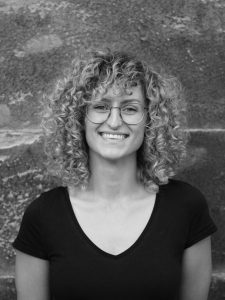Scarlett Wilks

Shortbio
- Since 2023 Associate Fellow at DFG Research Training Group 2227 “Identity and Heritage”, TU Berlin
- Since 2022 Research Assistant at the Institute of Urban and Regional Planning, Department Urban Conservation and Cultural Heritage, TU Berlin
- 2021–22 Research Assistant in the DFG project „Architektur- und Planungskollektive der DDR – Institutionelle Strukturen und kreative Prozesse in der sozialistischen Architekturproduktion“ at the Centre for Heritage Conservation Studies and Technologies (KDWT), University of Bamberg
- 2019–21 Master of Arts Heritage Conservation / Heritage Sciences, University of Bamberg
- 2016–19 Bachelor of Arts Culture and Technology / Art History, TU Berlin
Contact
Scarlett Wilks, M.A.
Wissenschaftliche Mitarbeiterin
Technische Universität Berlin
Fakultät VI | Institut für Stadt- und Regionalplanung
Fachgebiet Städtebauliche Denkmalpflege und urbanes Kulturerbe
Hardenbergstr. 40a
10623 BerlinRaum B 119 | Tel.: +49(0)30 314 28075
scarlett.wilks@tu-berlin.de
“Forgetting, Repressing, Suppressing – Lost Cities in the German Lignite Mining Areas”
In the dissertation project “Forgetting, Repressing, Suppressing – Lost Cities in the German Lignite Mining Areas” (working title), I examine the relationship between material cultural heritage and concepts of forgetting based on key texts of Memory Studies (cf. Halbwachs; Nora; Assmann; Connerton). Starting from the assumption that forgetting, like remembering, is an integral part of memory, the thesis examines how forgetting is articulated on a collective level on material objects. It is further examined how non-remembering influences the construction of cultural heritage and collective memory. The interdisciplinary research approach draws on findings and methods from Memory Studies, Sociology, and Heritage Studies.
In 1998, the ethnologist and anthropologist Marc Augé wrote in Oblivion (Les Formes de l’oubli): “[…] tell me what you forget and I tell you who you are.” According to this, forgetting is an individual act that can provide conclusions about a person and their social character. Going beyond this assumption, I base my work on the thesis that forgetting in societies can also be used to conclude their values, norms, and, above all, references to the past. Aleida Assmann describes collective memory as something dependent on political communities, which in a democracy includes the state, but also citizens, artists, political parties, and the media (Assmann 2020). Therefore, by examining collective forgetting as part of collective memory we can also learn something about a community.
Specifically, my dissertation project examines „Lost Cities“ in the three major German lignite mining areas, to analyze how collective forgetting manifests on a material level: Lausitzer Revier, Mitteldeutsches Revier, Rheinisches Revier. In my work, I understand the residents and involved actors as a social group. I investigate whether there are different collective memories within the group, who remembers and who forgets, and especially what they forget. A further level of my investigation is the temporality of forgetting, as this is not static, but processual. Memories can be rediscovered and something once remembered can be forgotten at another time.
In contrast to current research on cultural heritage, which usually looks at how it is construed from the perspective of remembering, this dissertation aims to explicitly focus on forgetting. The cities are analyzed in the context of their spatial and historical relation. The research questions are: How do concepts of abandonment and forgetting manifest on a material level? How do transformation processes such as deindustrialization influence local identities, and their relationship to the past between forgetting and remembering?
Publications
Das Kollektiv. Formen und Vorstellungen gemeinschaftlicher Architekturproduktion in der DDR (zusammen mit Stefanie Brünenberg, Harald Engler, Dirk Fordtran, Stephanie Herold und Sophie Stackmann), Berlin 2022.
Kollektiv und Kollaborativ. Positionen gemeinschaftlichen Arbeitens in der Architektur und Planung vom 20. Jahrhundert bis zu Gegenwart (Hrsg. zusammen mit Harald Engler und Stephanie Herold), Bamberg 2022.
In Szene gesetzte Planungskollektive. Eine Untersuchung fotografischer Darstellungen aus der DDR, in: Das Kollektiv. Formen und Vorstellungen gemeinschaftlicher Architekturproduktion in der DDR (zusammen mit Stefanie Brünenberg, Harald Engler, Stephanie Herold und Sophie Stackmann), Berlin 2022, S. 140–161.
Kreativität im bürokratischen Apparat? Exemplarische Analyse von zwei Planungsprozessen (zusammen mit Sophie Stackmann), in: Das Kollektiv. Formen und Vorstellungen gemeinschaftlicher Architekturproduktion in der DDR (zusammen mit Stefanie Brünenberg, Harald Engler, Stephanie Herold und Sophie Stackmann), Berlin 2022, S. 176–197.
Architektur- und Planungskollektive der DDR: Strukturen und Prozesse in der sozialistischen Architekturproduktion (zusammen mit Sophie Stackmann), KDWT-Bericht 2021–22, Bamberg 2023.